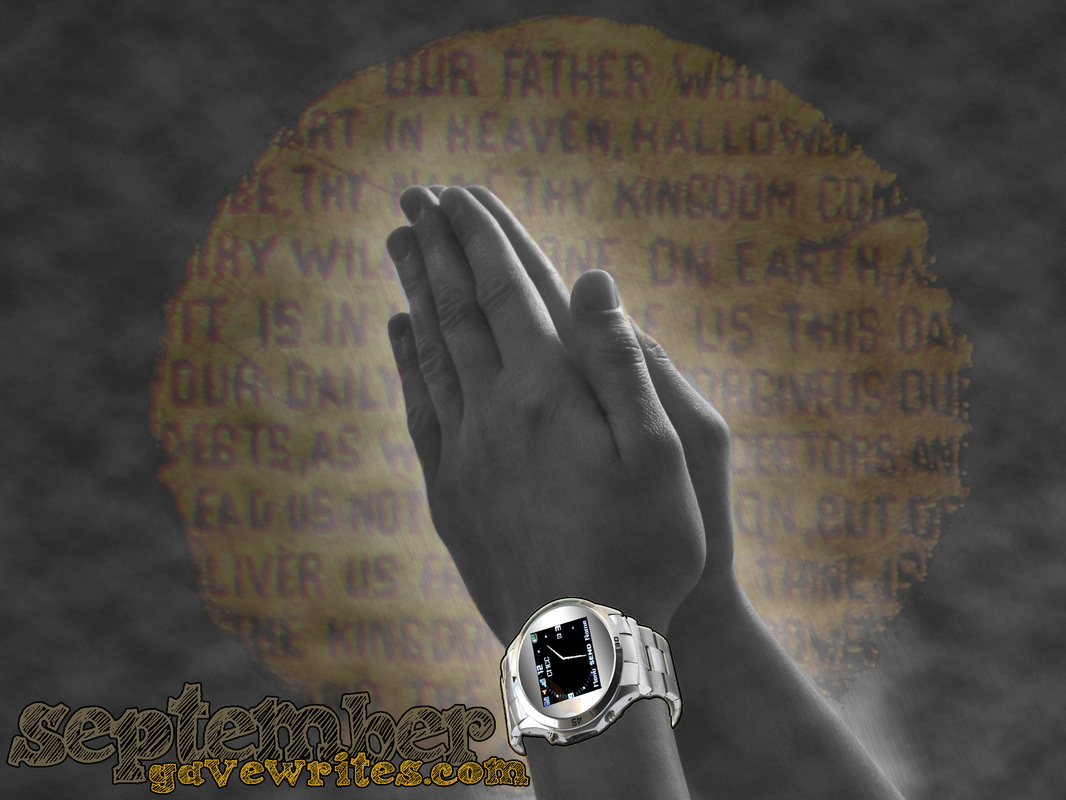I’m incredibly ashamed of my writing output this month – only three blogs in the past twenty days. Life is forcing me, no matter how hard I fight it, to face the fact that I can’t do everything. Each passing days brings me closer to my wedding (December 15th, if you’re keeping score at home) while simultaneously dropping a heap of matrimony-related tasks into my lap. At the same time, my workload at church has been on the rise. All while I’m trying to complete the final pre-publication proofreading of my book. Unfortunately, blogging’s been lost in the shuffle. And, as much as I hate to admit it, a prayer time or two have slipped through the cracks as well (but in my defense, I almost always try to make up for them).
No matter how busy life may be, though, I’ve still been privileged to see God at work around me. This past Saturday, a dear friend and coworker, the high school minister at my church, got married to his beautiful fiancé. It sounds cliché, but there’s no other way around this: it was awesome! Everything you'd want at a September wedding – dancing, BBQ, and bride and groom bobbleheads. What more could you ask for?
While he’s gone on his honeymoon, I’ve been lucky enough to be his fill-in, leading our weekly youth service on Sunday nights. Last Sunday, I began a new series entitled “Re:Focus,” a four-week examination of the Lord’s Prayer. Over the past month, God has literally been blowing my mind with those five verses from Matthew chapter six, the ones I’m (hypothetically) praying three times each day. I may have learned this prayer as a kid in Sunday School, but believe me, this stuff is not for the faint-of-heart. This prayer is dangerous; powerful; radical – it has the power to totally turn our lives upside down. Are we really brave (or stupid) enough to ask God to forgive us the way we forgive others? Can we honestly devote ourselves to seeing God’s will be done over our own? Will we approach the Creator of the entire universe, his truth filling unseen galaxies, and call Him our father? This prayer is wild and beautiful.
In youth service this past Sunday, we spent the entire night discussing the ramifications of four words, “Our Father, in Heaven.” These must be one of the most powerful phrases in the entire Bible. The God of creation – of the Egyptian plagues, Ezekiel’s dry bones, Christ’s resurrection and Pentecost – allows us to approach Him as our father. He is powerful, holy and righteous; we are weak, depraved and broken; and yet, as Galatians 4 reminds us, He chooses to adopt us as His own. All who follow God’s commands, Christ teaches in Matthew 12, are children of the most high. Paul, in his letter to the church at Ephesus, writes that we’re not only adopted into God’s family, but He considers us his “masterpiece, created anew in Christ Jesus.” The Hubble space telescope has taken some of the most awe-inspiring photographs of our universe, but the God who created it all calls us His masterpiece. Wow!
At twenty-seven years old, I still struggle with my identity – in fact, it seems to be almost constantly under assault. On one side, society preaches that I’ll never be accepted or loved until I make more money; buy a nicer car; write a successful book; starting moving up the social ladder. From the opposite flank comes the evil one, whispering that I’m a disappointment to God, unlovable and irredeemable. But in the midst of it all, the Savior’s voice rises above the din, teaching me to pray – “Our Father” – reminding me that no matter what claims the world or the evil one may try to make upon my identity, the Creator is the only one capable of telling who I am. I love how John, in his first letter, emphatically hits this point. “The Father… loves us so much that we are actually God’s children,” he writes, “And that’s what we are.”
My prayer for you today is that you get a little taste of the Father’s love, to allow Him to tell you who you truly are – His beloved son or daughter.
No matter how busy life may be, though, I’ve still been privileged to see God at work around me. This past Saturday, a dear friend and coworker, the high school minister at my church, got married to his beautiful fiancé. It sounds cliché, but there’s no other way around this: it was awesome! Everything you'd want at a September wedding – dancing, BBQ, and bride and groom bobbleheads. What more could you ask for?
While he’s gone on his honeymoon, I’ve been lucky enough to be his fill-in, leading our weekly youth service on Sunday nights. Last Sunday, I began a new series entitled “Re:Focus,” a four-week examination of the Lord’s Prayer. Over the past month, God has literally been blowing my mind with those five verses from Matthew chapter six, the ones I’m (hypothetically) praying three times each day. I may have learned this prayer as a kid in Sunday School, but believe me, this stuff is not for the faint-of-heart. This prayer is dangerous; powerful; radical – it has the power to totally turn our lives upside down. Are we really brave (or stupid) enough to ask God to forgive us the way we forgive others? Can we honestly devote ourselves to seeing God’s will be done over our own? Will we approach the Creator of the entire universe, his truth filling unseen galaxies, and call Him our father? This prayer is wild and beautiful.
In youth service this past Sunday, we spent the entire night discussing the ramifications of four words, “Our Father, in Heaven.” These must be one of the most powerful phrases in the entire Bible. The God of creation – of the Egyptian plagues, Ezekiel’s dry bones, Christ’s resurrection and Pentecost – allows us to approach Him as our father. He is powerful, holy and righteous; we are weak, depraved and broken; and yet, as Galatians 4 reminds us, He chooses to adopt us as His own. All who follow God’s commands, Christ teaches in Matthew 12, are children of the most high. Paul, in his letter to the church at Ephesus, writes that we’re not only adopted into God’s family, but He considers us his “masterpiece, created anew in Christ Jesus.” The Hubble space telescope has taken some of the most awe-inspiring photographs of our universe, but the God who created it all calls us His masterpiece. Wow!
At twenty-seven years old, I still struggle with my identity – in fact, it seems to be almost constantly under assault. On one side, society preaches that I’ll never be accepted or loved until I make more money; buy a nicer car; write a successful book; starting moving up the social ladder. From the opposite flank comes the evil one, whispering that I’m a disappointment to God, unlovable and irredeemable. But in the midst of it all, the Savior’s voice rises above the din, teaching me to pray – “Our Father” – reminding me that no matter what claims the world or the evil one may try to make upon my identity, the Creator is the only one capable of telling who I am. I love how John, in his first letter, emphatically hits this point. “The Father… loves us so much that we are actually God’s children,” he writes, “And that’s what we are.”
My prayer for you today is that you get a little taste of the Father’s love, to allow Him to tell you who you truly are – His beloved son or daughter.


 RSS Feed
RSS Feed